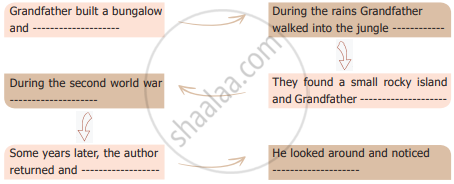Advertisements
Advertisements
प्रश्न
Are there any stories/legends about the moon or special names for the moon in your language? Talk to your friends and family members and collect this information.
उत्तर
Step 1: Ask About Stories and Legends
- Talk to elders: Grandparents and older relatives often know folklore or stories involving the moon.
- Examples of Stories:
- India: The story of Chandra, the moon god, in Hindu mythology, who is associated with beauty and coolness.
- China: The legend of Chang'e, the moon goddess, and the Mid-Autumn Festival.
- Native American Tribes: Stories about the moon as a guide and protector during the night.
Step 2: Find Special Names for the Moon
- In your language, ask if there are:
- Traditional names: Names used for the moon in poetry or songs.
- Cultural references: Names that describe phases of the moon, like the full moon or new moon.
- Examples:
- Hindi: The moon is called Chand or Chandra, and the full moon is known as Purnima.
- Japanese: The moon is called Tsuki, and there is a term Otsukimi for moon-viewing festivals.
- English: Harvest Moon, Hunter’s Moon, Blue Moon.
Step 3: Write and Share
- Once you’ve collected the stories and names, organize them:
- Summarize the stories: Write a short version to share with friends.
- List the names: Include meanings or contexts if possible.
Example to Share:
"In my culture, the moon is often called Chand in Hindi. One famous story is about Lord Ganesha cursing the moon for its arrogance, saying anyone who gazes at it on Ganesh Chaturthi would face bad luck. This led to a cultural tradition of avoiding moon sightings on that day. The moon also has poetic names like Raka for the full moon and Amavasya for the new moon."
संबंधित प्रश्न
Answer any three of the following in 30-40 words each:
(a) Why has the poet’s mother been compared to the ‘late winter’s moon’?
(b) The poet says, ‘And yet, for these Children, these windows, not this map, their world.’ Which world do these children belong to? Which world is inaccessible to them?
(c) What was the plea of the folk who had put up the roadside stand?
(d) What will happen to Aunt Jennifer’s tigers when she is dead?
Discuss in pairs or in small groups
The description of novels as organisms.
How does the nightingale's song plunge the poet into a state of ecstasy?
Form groups and discuss the following statements, in the context of the extract.
‘If he is indeed wise, he does not bid you to enter the house of his wisdom, but rather leads you to the threshold of your own mind’ Kahlil Gibran.
Think carefully for a minute.
Jog your memory and recall all the things/objects on which you have seen wheels. Write them down
Now, talk to your friends or elders; refer to books and read about all the objects on which wheels are used. List them. (How many did you miss out on in your first list? Why?)
Write a summary based on the story map.

What was the epidemic that broke out in the story?
What did the hen-pigeon whisper?
Like whom did they want to do?
